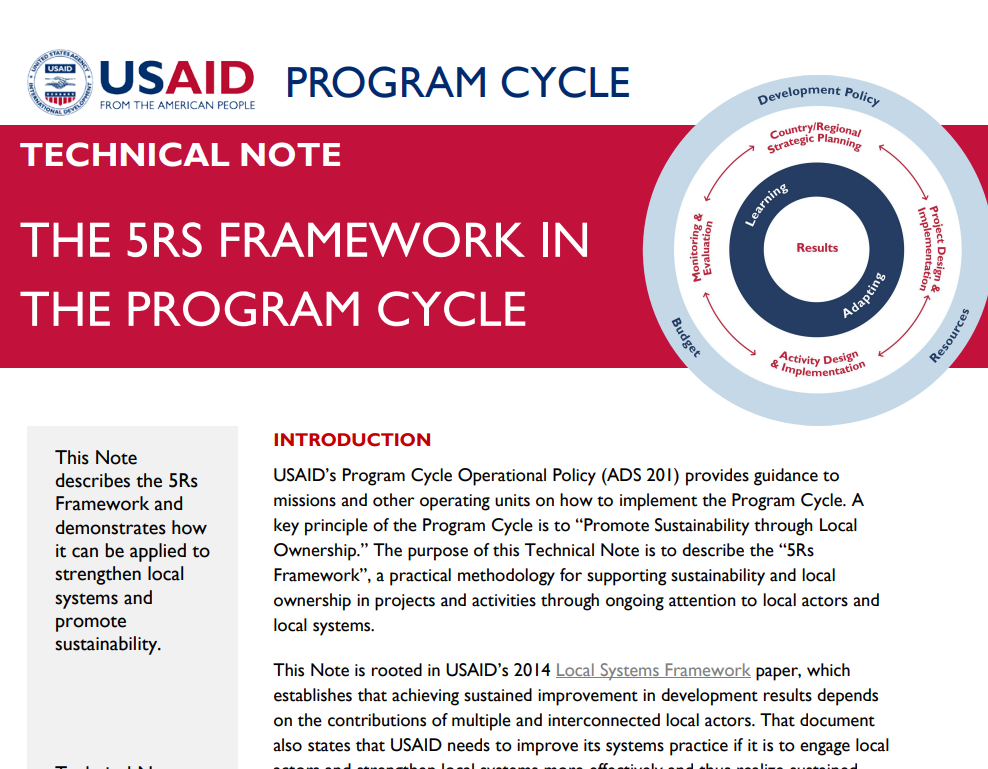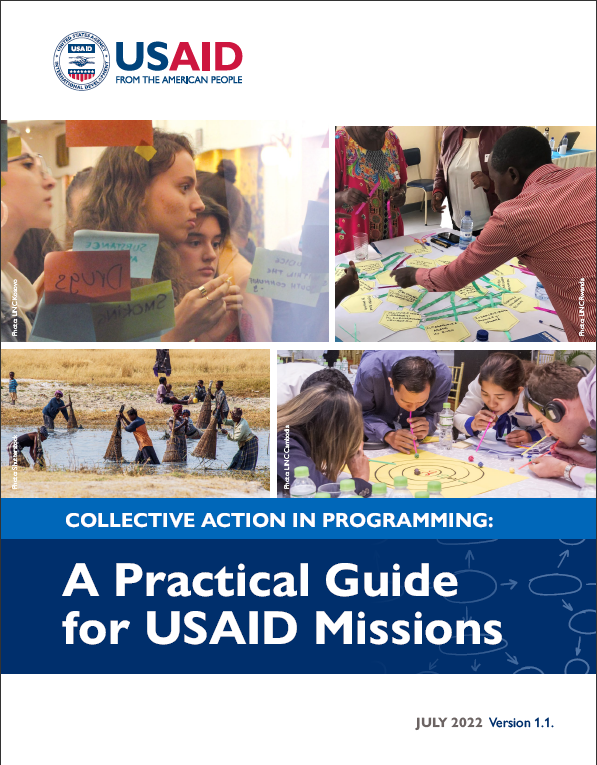
Key Technical Resources

The 5Rs Framework in the Program Cycle
This USAID Technical Note describes the 5Rs Framework and demonstrates how it can be applied to strengthen local systems and promote sustainability.

Collective Action Practical Guide (2022)
This practical guide helps to integrate Collective Action into programming by offering tools, examples, and step-by-step modules for designing and supporting inclusive, locally-led coalitions.

US Democracy Organizational Mapping
This is part of an ongoing research project to map out US based democracy organizational infrastructure.

Democracy Narratives in Action Resources
Advancing support for liberal democracy and more effectively countering authoritarian narratives and attacks on democratic principles and institutions requires evidence-based pro-democracy narratives. You can find the open access Democracy Narrative Research and Resources including:
• global and U.S. research reports
• narrative and message frameworks
• summaries with resources and non-technical language glossary
• updated narrative model and worksheets
• information on the Pro-Democracy Narrative Playbook

Atrocity Prevention: A Development Practitioner's Guide
This USAID guide provides practical tools and information for development practitioners to prevent and respond to mass atrocities. It helps staff identify early warning signs, develop appropriate responses, and coordinate with government colleagues as part of comprehensive U.S. atrocity prevention efforts. The guide distinguishes atrocity prevention from general conflict prevention, focusing on perpetrators and how development tools can help dissuade potential actors from committing mass atrocities, while offering flexible reading approaches based on practitioners' roles and available time.

Policy for Countering Violent Extremism Through Development Assistance
This USAID policy provides updated guidance for countering violent extremism through development programs, emphasizing systemic strengthening of local institutions and communities rather than addressing isolated drivers. The policy focuses on building partnerships with local actors, engaging where U.S. assistance can be most effective, and adapting to evolving extremist threats. It aims to reduce recruitment into violent extremism and build partner capacity for self-reliant prevention and response, while integrating CVE efforts with broader U.S. development and security objectives.

USAID Humanitarian Assistance Anti-Corruption Integration Handbook
The USAID Humanitarian Assistance Anti-Corruption Integration Handbook is a comprehensive guide developed by the U.S. Agency for International Development (USAID) to support the integration of anti-corruption strategies into humanitarian aid programming. It is aimed at USAID staff, implementing partners, and humanitarian practitioners, providing technical guidance, risk management tools, and accountability mechanisms to safeguard aid delivery in high-risk environments.

USAID Guide to Countering Corruption Across Sectors
This USAID Guide to Countering Corruption Across Sectors is the first comprehensive technical guidance document designed to transform USAID's anti-corruption approaches and programming. Developed by USAID's Anti-Corruption Task Force (ACTF) with contributions from staff across the Agency's offices, bureaus, and missions, the guide serves as part of a broader suite of anti-corruption resources. It provides sectoral guidance and practical tools to help USAID personnel integrate anti-corruption strategies into their development work across various sectors and programming areas.

Analyzing Transnational and Strategic Corruption and Kleptocracy (TASCK) in Sub-Saharan Africa: Phase 1 Findings & Co-Creation Workshop Summary Report
This research study examines transnational corruption, strategic corruption, and kleptocracy (TASCK) in sub-Saharan Africa to help USAID improve its anti-corruption programming. Following recent U.S. policy directives, the study addresses how these sophisticated, cross-border forms of corruption impact African communities and whether current development responses adequately address them. The research aims to provide Africa-specific insights to help USAID adapt its programming to more effectively counter corruption that undermines government legitimacy and diverts public resources.

Analyzing Transnational and Strategic Corruption and Kleptocracy (TASCK) in Sub-Saharan Africa: Phase II Findings Report
This study examines how transnational and strategic corruption and kleptocracy (TASCK) affect governance and development in sub-Saharan Africa. Phase I identified key sectors and regions impacted, while Phase II focused on elections and natural resources in Madagascar and Nigeria. Findings aim to help USAID and other agencies better address TASCK through targeted programming.


Rule of Law IDEAS CoLab
The Rule of Law IDEAS CoLab is an innovation hub reimagining justice. We design people-centered, data-driven solutions, offer practical tools and resources, and host the xUSAID Rule of Law Repository—all to help close the global justice gap and build trust in legal systems.

Countering Violent Extremism (CVE) Reference Guide
The idea for creating an online CVE Reference Guide for Local Organizations came directly from civil society organizations implementing projects to prevent and counter violent extremism (P/CVE). Many of these local organizations in countries affected by violent conflict struggle to access practical, concise, and relevant materials and tools designed specifically for their use and in their primary languages.

DECfinder: Preserving Development Knowledge for the Future
DECfinder gives you access to over 111,000+ curated documents from USAID’s Development Experience Clearinghouse (DEC) — including evaluations, reports, and project insights from decades of U.S. development work around the world.

Collaborating, learning, and adapting informed by evidence (CLAIRE)
This study seeks to understand how USAID and its partners conduct CLA and to generate lessons for how it can improve CLA going forward. In particular, it employs a qualitative research methodology to explore the role of evidence in the CLA process and to disprove or validate the following hypothesis: IF monitoring, evaluation, and learning (MEL) is planned and used to inform CLA, THEN adaptations are more likely to lead to program outcomes.

Election Management Assistance Donor Guide
The U.S. Agency for International Development (USAID) provides assistance to election management bodies (EMBs) as a core component of its electoral assistance and broader Democracy, Human Rights, and Governance (DRG) programming. This guide provides a brief overview of election management assistance and offers strategic considerations and programming options for USAID and other donor agencies. While the primary audience of this guide is USAID staff, its content may be useful to other donors and other audiences.

Impact of Investing in Cities and Local Governments
The Making Cities Work (MCW) indefinite delivery, indefinite quantity (IDIQ) contract (2014-2024) issued 18 task orders (TOs) for urban governance work, totaling over $500 million. MCW aims to provide access to short- and long-term technical services, training, and capacity-strengthening in areas related to improving urban and local governance.

Tools for asking better evaluation questions
The purpose of this research is to systematically explore the common challenges of developing quality DRG PE questions and to develop guidance for USAID staff to maximize the utility of PE questions.

Electoral Assistance After Action Review Methodology
This EA3 review methodology provides a standardized methodology for post-election assessments to ensure consistency and improve learning from the United States Agency for International Development’s (USAID’s) worldwide support of elections and political processes. This manual provides guidance to assessment teams conducting in-country reviews after an electoral process, outlining key areas of inquiry and research questions.

USAID Guiding Principles for Electoral Assistance
USAID’s Guiding Principles for Electoral Assistance are intended to enhance USAID’s support for democratic elections and political processes globally.
Missing Resource Form
See something missing? Want to add a missing resource? Fill out the form below. Thank you in advance.
